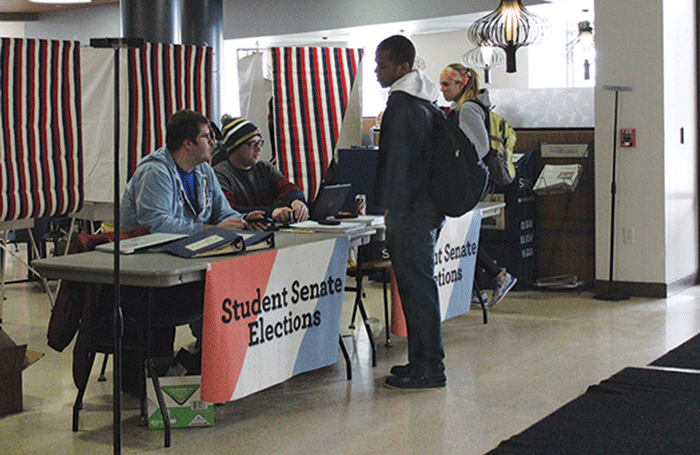Student Senate to hold upcoming elections online
Paper balloting will become a thing of the past
Photo by FILE PHOTO
March 17, 2015
As students prepare to vote for the upcoming Student Senate elections, they won’t need to travel to campus to cast their vote — this time around, students can find a ballot in their inbox once voting begins.
Student Senate voted in favor of online ballots for the April 20-22 election Monday night after three sessions of discussion, in effect giving students direct access to a virtual polling place and more time to cast votes. These advantages, however, come at the risk of Student Senate’s inability to entirely prevent outside influence while votes are taking place.
The new system will generate a unique survey link through which a student can cast votes, Parliamentarian Karissa Mueller said.
The format would not change from paper ballots; students still have the option to choose up to 11 on-campus, 19 off-campus senators and the presidential/vice presidential ticket of their choice, as well as write-ins for any of the options.
The change came after LTS informed Senate about three weeks ago it would no longer be able to process printed ballots for future elections, Mueller said. In an effort to handle the situation as swiftly as possible, she said she had a draft up by the next election.
“I would rather have the language written now,” Mueller said, “as opposed to multiple amendments about it in the future.”
Mueller said paper ballots forced students to “fight against time and location” by requiring students to budget time to cast a ballot and show up to one of three polling places offered throughout elections.
The link would not close in the same way traditional polling places would, Mueller said, allowing students to cast votes at any time between open and close.
Because the move to the e-ballot guarantees students have “no short way of access,” Mueller said online ballots would erase the need for polling places altogether, but not necessarily the need for advertisement of open elections.
Multiple senators voiced their approval of the switch, yet favored the idea of offering an on-campus polling place for students, and visible tabling to draw attention to the elections.
Senator Thompson Isaac said it would “remind people of their obligation of voting,” and would preserve the memory of a polling place.
Yet the move to e-ballots prevents Student Senate from having any sort of oversight when the vote takes place.
Mueller said campaigning is already limited to areas 20 feet outside of any given computer lab or classroom and 50 feet from Davies Center, but the direct influence of online campaigning materials, such as a Facebook campaign page, is something Senate cannot fully enforce.
Senate has had past cases of integrity issues, but Mueller said candidates will be made aware of the restrictions.
“If Senate feels they weren’t handled with integrity to the extent needed,” Mueller said, “they would throw out the results.”
Senator Mat Riedel said the changes have already affected the election process by forcing students to wait to begin petitioning for votes until Wednesday, two days after it would have normally been scheduled to begin.
“It gives us less time to work out kinks, and less time to feel out the new election process,” Riedel said.
Despite this, Mueller said the setback would not change much for petitioners or voter turnout, as online voting is familiar to most students through homecoming and past Student Senate elections.
“It’s something we’ve used in the past, and it has the potential to reach more,” Mueller said.

